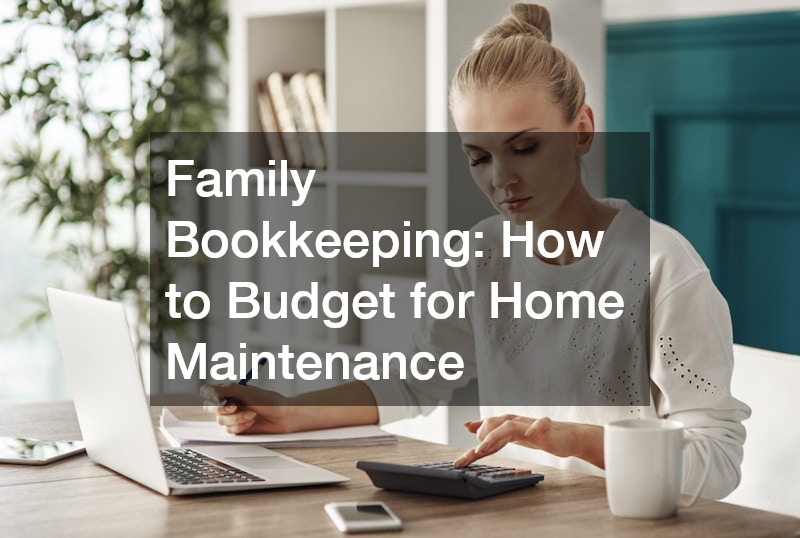
Managing a household involves more than just paying bills; it requires a strategic approach to finances, especially when budgeting for home maintenance. Family bookkeeping is crucial in this respect, allowing families to allocate resources wisely, anticipate needs, and ensure that their homes remain safe and comfortable. In this article, we will delve into effective strategies for budgeting home maintenance costs, incorporating essential aspects of family bookkeeping to help you avoid financial pitfalls while maintaining the integrity of your home.
1. Why is Home Maintenance Budgeting Important in Family Bookkeeping?
1.1. Preventing Costly Repairs
One of the primary reasons to budget for home maintenance is to prevent costly repairs. Regular maintenance helps identify small issues before they escalate into significant problems. For instance, neglecting a minor plumbing leak could lead to the need for an expensive plumber and substantial water damage repairs. By planning for regular upkeep, such as cleaning gutters or scheduling a hydro jetting service, families can save substantial amounts over time.
1.2. Enhancing Property Value
Investing in home maintenance is also a smart way to enhance property value. A well-maintained home attracts potential buyers and can yield a higher resale price. Projects like solar panel installation not only improve energy efficiency but also increase home value. By budgeting for these enhancements, families can make their homes more appealing in the long run.
1.3. Maintaining Safety and Comfort
Finally, regular home maintenance is essential for ensuring safety and comfort. Homes are where families spend most of their time, and maintaining structural integrity is crucial. Routine checks on systems like heating and cooling or scheduling a dormer service to ensure your roof is secure can prevent unexpected failures that compromise safety.
2. How to Start a Family Bookkeeping System for Home Maintenance?
2.1. Choosing the Right Tools
Starting a family bookkeeping system requires the right tools. You can opt for traditional methods like notebooks or spreadsheets, or leverage modern technology through apps designed for budgeting and expense tracking. For families handling larger projects, organizing finances around contractor supplies might also be useful.
2.2. Setting Up a Ledger
Establishing a ledger is an effective way to track home maintenance expenses. Your ledger should include all expenditures related to home upkeep, from minor repairs to major projects. Be sure to create categories that encompass different areas, such as plumbing, roofing, or landscaping, and include specific services like fence installer fees or overhead door repaircosts.
2.3. Regularly Updating Records
To ensure accuracy, update your records regularly. Set a schedule for reviewing your ledger—ideally every month—to capture all expenses and assess your budget’s effectiveness. This habit not only helps keep you on track but also allows you to anticipate future needs.

3. What Are the Essential Components of a Home Maintenance Budget?
3.1. Routine Maintenance Costs
Routine maintenance costs should form the backbone of your home maintenance budget. These include regular expenses such as lawn care, HVAC servicing, or pest control. For example, if you own a lawn mower, consider budgeting for financing for mowers if you need an upgrade.
3.2. Emergency Fund Allocations
Setting aside an emergency fund is vital for unforeseen repairs. Home issues can arise suddenly, from a burst pipe needing a plumber’s immediate attention to an unexpected storm damaging your roof. Having an emergency fund allows families to address these emergencies without straining their overall budget.
3.3. Long-term Improvement Plans
In addition to routine maintenance, consider allocating funds for long-term improvements. This could include renovations that enhance your home’s efficiency or aesthetics, such as blown-in insulation for better energy savings or upgrading your kitchen. Planning for these projects ensures that you’re ready when opportunities arise.
4. How Often Should a Family Review Their Home Maintenance Budget?
4.1. Quarterly Reviews
Conducting quarterly reviews of your home maintenance budget is recommended. This allows you to assess your spending patterns and make necessary adjustments. For instance, if you find that you’re consistently overspending on contractor supplies, you can investigate why and adjust accordingly.
4.2. Annual Assessments
An annual assessment provides a comprehensive view of your home’s financial health. During this review, evaluate how well your budget aligned with your actual expenditures over the year. It’s an opportunity to make strategic decisions about which areas of your home need more attention.
4.3. Adjusting for Lifestyle Changes
Lifestyle changes, such as welcoming a new family member or starting a home-based business, can significantly impact your home maintenance budget. Be sure to adjust your budget accordingly, considering any additional needs that may arise.

5. How Can Families Cut Costs on Home Maintenance?
5.1. DIY Maintenance Tips
Many home maintenance tasks can be tackled with a bit of effort and research. Simple projects like painting a room or performing minor landscaping can save substantial costs. Online tutorials and local workshops can provide the knowledge needed for these DIY efforts.
5.2. Seasonal Discounts and Offers
Keep an eye out for seasonal discounts and offers from service providers. Many contractors and suppliers offer deals during off-peak seasons, making it an ideal time for services like solar panel installation or securing fence installerdiscounts.
5.3. Energy Efficiency Improvements
Investing in energy efficiency can lead to long-term savings. Consider implementing improvements such as blown-in insulation, which can reduce heating and cooling costs significantly. Over time, these savings can offset the initial investment.
6. When Should Families Consider Professional Help?
6.1. Assessing the Complexity of Repairs
Some home maintenance tasks require professional expertise. If you encounter complex repairs—like structural issues that require a structural engineer—it’s wise to seek professional help to ensure safety and compliance with regulations.
6.2. Evaluating Cost Efficiency
Sometimes hiring a professional can save you money in the long run. For example, if your overhead door needs repair, a qualified technician can quickly assess the situation, potentially preventing further damage that might occur from a DIY attempt. Hiring structural engineers from the start can save you countless headaches down the way as well.
6.3. Hiring and Vetting Contractors
When it comes to hiring professionals, vetting contractors is essential. Seek recommendations, check reviews, and ensure they have the proper licenses and insurance. This will help you avoid costly mistakes and ensure quality work.
7. How to Plan for Unexpected Home Maintenance Costs?
7.1. Building an Emergency Fund
As previously mentioned, building an emergency fund is critical for managing unexpected costs. Aim to set aside at least three to six months’ worth of home maintenance expenses in this fund.
7.2. Prioritizing Repairs
When unexpected issues arise, prioritize repairs based on urgency. A leak from a roof might take precedence over cosmetic improvements, such as painting or landscaping. Updating blown in insulation may not seem like a priority, but it can save on energy bills. Establishing a priority system can help you allocate resources effectively.
7.3. Finding Financing Options
If faced with an urgent repair that exceeds your budget, consider exploring financing options. Many service providers offer payment plans or financing for larger projects, such as solar panel installation, which can help alleviate immediate financial burdens.

8. What are Common Mistakes in Home Maintenance Budgeting?
8.1. Overlooking Small Repairs
Many families overlook the importance of small repairs, believing they can wait. However, neglecting these can lead to more significant, costly issues down the line. Regularly inspect your home and budget for minor repairs to avoid this pitfall.
8.2. Ignoring Inflation
Ignoring inflation can skew your budgeting accuracy. Costs for materials, labor, and services like hydro jetting can increase over time. It’s essential to adjust your budget annually to account for these changes to avoid being caught off guard.
8.3. Underestimating Costs
Underestimating costs is another common mistake. Always factor in potential additional expenses when budgeting for repairs or improvements. Whether you’re working with a contractor supplies list or hiring a professional, be prepared for unexpected costs.
9. How to Incorporate Future Home Improvement Projects in the Budget?
9.1. Prioritizing Projects
When planning for future home improvements, prioritize projects based on necessity and potential impact. For example, if your roof is nearing the end of its lifespan, that should take precedence over aesthetic upgrades.
9.2. Estimating Costs and Benefits
Accurate cost estimation is critical for successful budgeting. Research potential expenses for each project, including labor and materials, and weigh them against the benefits, such as energy savings or increased home value.
9.3. Setting Long-term Financial Goals
Set long-term financial goals that align with your home improvement projects. For instance, if you’re aiming for solar panel installation, factor in how this project fits into your overall financial strategy and timeline.
10. What Tools and Apps Can Assist in Family Bookkeeping for Home Maintenance?
10.1. Digital Ledger Solutions
Digital ledger solutions can streamline your bookkeeping efforts. Many apps allow you to categorize expenses, set reminders for maintenance tasks, and visualize your spending trends effectively.
10.2. Expense Tracking Apps
Expense tracking apps are another useful tool for families. They help you monitor and analyze spending patterns, making it easier to stick to your home maintenance budget.
10.3. Home Maintenance Schedulers
Home maintenance schedulers can be invaluable for keeping track of routine maintenance tasks. These tools remind you when services are due, ensuring that you stay on top of necessary upkeep.

11. Building a Community for Home Maintenance Support
11.1. Engaging Neighbors and Local Resources
Building a sense of community can significantly benefit your home maintenance efforts. Engaging with neighbors can provide valuable insights and support for various projects. For instance, if several families in your neighborhood are considering solar panel installation, you might be able to negotiate bulk discounts with contractors or share information on the best local providers.
11.2. Sharing Tools and Resources
Many home maintenance tasks require tools that may only be used occasionally. Consider creating a tool-sharing network with neighbors. This not only reduces the cost of purchasing equipment like lawn mowers or power washers but also fosters community connections. You could organize a monthly meeting to discuss ongoing home projects, share DIY tips, and even arrange for group discounts on services from local contractors.
11.3. Local Workshops and Classes
Take advantage of local workshops and classes focused on home maintenance. Many community centers, hardware stores, and extension services offer free or low-cost sessions on topics such as plumbing basics, efficient landscaping, or DIY repairs. Participating in these classes can provide you with the knowledge to tackle minor projects yourself, saving money on hiring professionals. Additionally, networking with others at these events can lead to new friendships and potential collaborations for larger projects.
Conclusion
Incorporating diligent family bookkeeping practices into your home maintenance budgeting is essential for a financially healthy household. By planning ahead, utilizing the right tools, and routinely reviewing your budget, you can maintain your home efficiently while strengthening your financial stability. Whether it’s budgeting for a plumber, organizing financing for mowers, or planning for future projects like solar panel installation, a proactive approach will serve your family well.
A well-maintained home not only enhances your living environment but also protects your investment. By prioritizing regular maintenance, setting aside funds for emergencies, and leveraging technology to manage your expenses, you can ensure that your home remains a safe, comfortable, and enjoyable place for your family.
As you move forward, remember to regularly review and adjust your budget based on changing circumstances and unexpected needs. This flexibility will empower you to handle the inevitable surprises that come with home ownership, whether it’s a sudden need for overhead door repair or hiring a fence installer to enhance your backyard.
Ultimately, successful family bookkeeping for home maintenance is about balance—between immediate needs and future improvements, between DIY efforts and professional help, and between current expenses and long-term goals. By staying organized and informed, you can keep your home in excellent condition while maintaining financial peace of mind.



